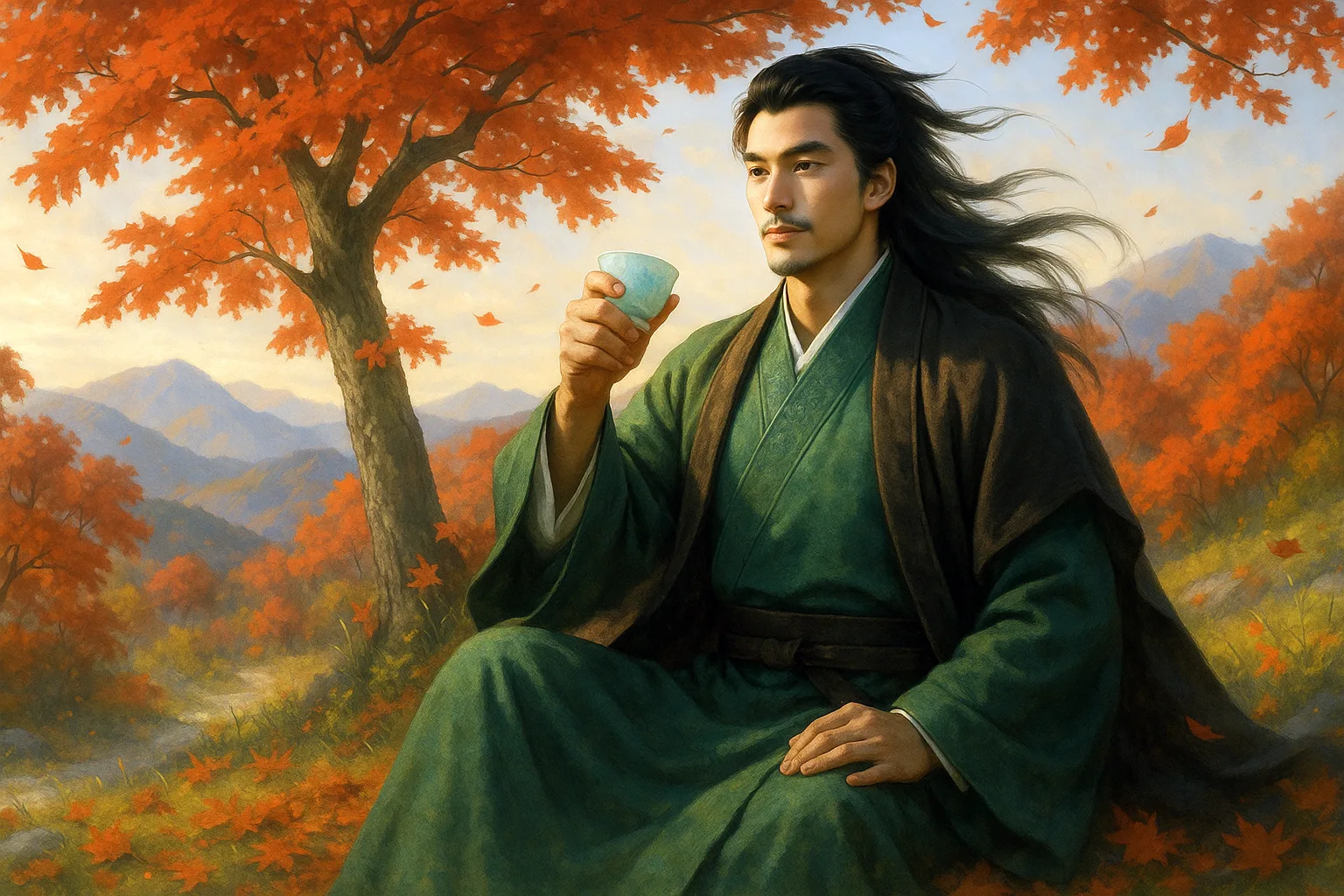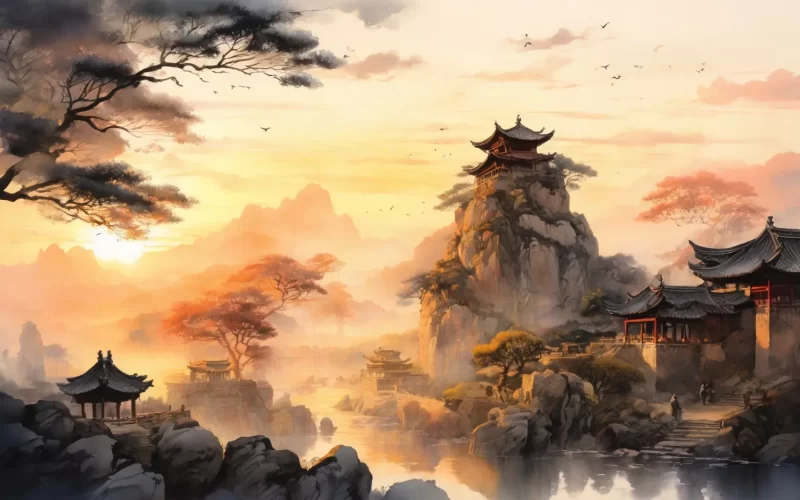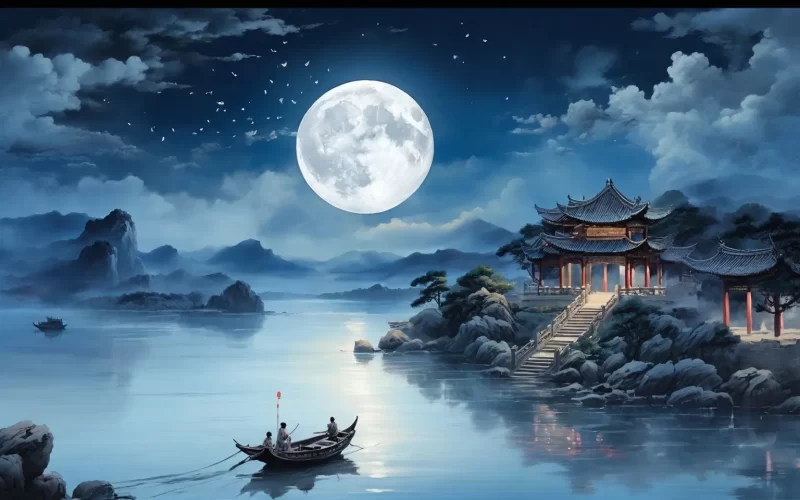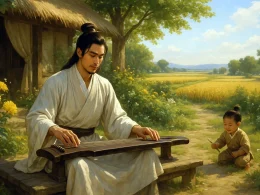Stories of passion make sweet dust,
Calm water, grasses unconcerned.
At sunset, when birds cry in the wind,
Petals are falling like a girl s robe long ago.
Original Poem:
「金谷园」
杜牧
繁华事散逐香尘,流水无情草自春。
日暮东风怨啼鸟,落花犹似坠楼人。
Interpretation:
"The Garden of the Golden Valley" was composed by Du Mu during his visit to the Golden Valley Garden in Luoyang. Originally the luxurious villa of Shi Chong, a wealthy aristocrat of the Western Jin Dynasty, the garden was renowned for its opulence. Shi Chong's beloved concubine, Green Pearl, famously leapt to her death from a tower to preserve her honor. As Du Mu wandered through the garden, he was struck by the contrast between its former glory and its current state of decline. Inspired by the story of Green Pearl, he wrote this poem to reflect on the impermanence of life and the passage of time.
First Couplet: "繁华事散逐香尘,流水无情草自春。"
Fánhuá shì sàn zhú xiāng chén, liúshuǐ wúqíng cǎo zì chūn.
The splendor of the past has scattered like fragrant dust; the flowing water is indifferent, and the grass greets spring on its own.
Du Mu uses "fragrant dust" (香尘) as a metaphor for the fleeting nature of the Golden Valley Garden's former glory, which has vanished like smoke. The flowing water and the grass, which continues to grow each spring, symbolize the indifference of nature to human affairs. The word "on its own" (自) is particularly poignant, emphasizing the cyclical and unchanging nature of the natural world, in stark contrast to the transient and fragile nature of human existence.
Second Couplet: "日暮东风怨啼鸟,落花犹似坠楼人。"
Rìmù dōngfēng yuàn tí niǎo, luòhuā yóu sì zhuì lóu rén.
At dusk, the east wind carries the mournful cries of birds; the falling petals resemble the woman who leapt from the tower.
This couplet paints a melancholic scene as dusk falls. The east wind, the cries of birds, and the falling petals create an atmosphere of sorrow and loss. Du Mu draws a parallel between the falling petals and Green Pearl's tragic leap, using the word "resemble" (犹似) to evoke a sense of empathy and lament for her fate. The imagery of the falling petals not only captures the beauty of the moment but also serves as a poignant reminder of the fragility of life.
Overall Appreciation
This poem is a meditation on the impermanence of human achievements and the inevitability of decline.
The first couplet contrasts the fleeting nature of human glory with the enduring cycles of nature. The "fragrant dust" symbolizes the ephemeral nature of wealth and power, while the flowing water and the grass highlight the indifference of the natural world to human affairs. This contrast underscores the transient nature of human existence and the futility of clinging to material success.
The second couplet shifts to a more emotional tone, using the imagery of dusk, wind, birds, and falling petals to evoke a sense of melancholy and loss. The comparison between the falling petals and Green Pearl's tragic fate adds a layer of historical and emotional depth to the poem. Du Mu's lament for Green Pearl is not just a personal expression of sorrow but also a broader reflection on the fragility of beauty and the inevitability of decline.
The poem's strength lies in its ability to blend historical narrative with natural imagery, creating a rich tapestry of meaning. Du Mu's reflections on the Golden Valley Garden and the story of Green Pearl serve as a powerful reminder of the impermanence of human achievements and the enduring cycles of nature.
Writing Characteristics
- Blending Scene and Emotion
Du Mu seamlessly integrates natural imagery with emotional reflection, using the scenery of the Golden Valley Garden to evoke a sense of melancholy and loss. - Historical Allusion and Symbolism
The reference to Green Pearl's tragic fate adds historical and emotional depth to the poem, while the imagery of falling petals symbolizes the fragility of beauty and life. - Contrast Between Transience and Permanence
The poem contrasts the fleeting nature of human glory with the enduring cycles of nature, highlighting the impermanence of material success and the inevitability of decline. - Elegant Language and Poignant Imagery
Du Mu's use of elegant language and vivid imagery creates a powerful emotional impact, drawing the reader into the poem's reflective and melancholic atmosphere.
Insights
This poem offers a profound meditation on the impermanence of human achievements and the inevitability of decline. By contrasting the fleeting nature of wealth and power with the enduring cycles of nature, Du Mu reminds us of the futility of clinging to material success and the importance of finding meaning in the transient beauty of life.
The story of Green Pearl serves as a poignant reminder of the fragility of beauty and the tragic consequences of human ambition. Du Mu's lament for her fate is not just a personal expression of sorrow but also a broader reflection on the human condition and the inevitability of decline.
Ultimately, "Reflections at the Golden Valley Garden" is a powerful reminder to cherish the present moment, to find beauty in the fleeting, and to seek meaning beyond the material. It challenges us to reflect on our own lives and to find solace in the enduring cycles of nature and the timeless lessons of history.
About the poet:

Du Mu (杜牧), 803-853 AD, was a native of Xi'an, Shaanxi Province. Among the poets of the Late Tang Dynasty, he was one of those who had his own characteristics, and later people called Li Shangyin and Du Mu as "Little Li and Du". His poems are bright and colorful.
Poem translator:
Kiang Kanghu











